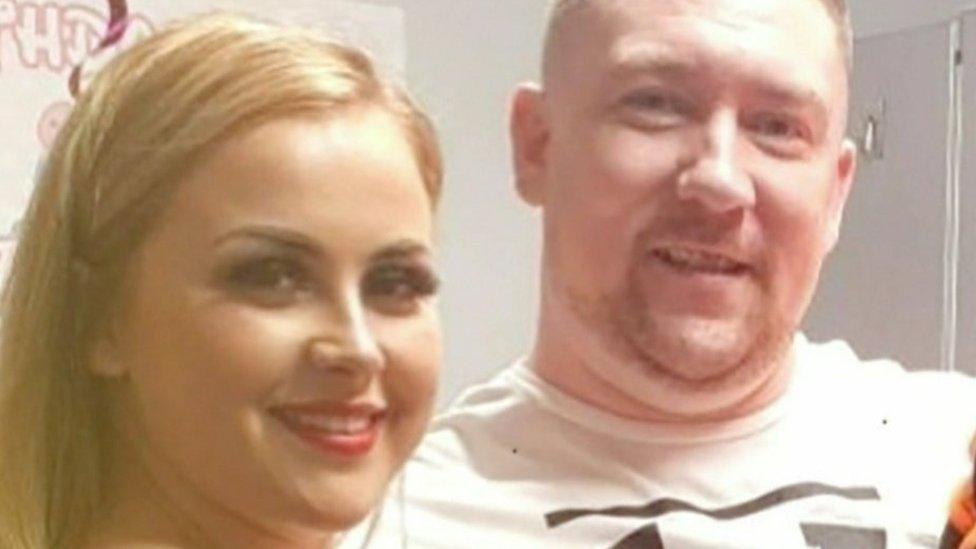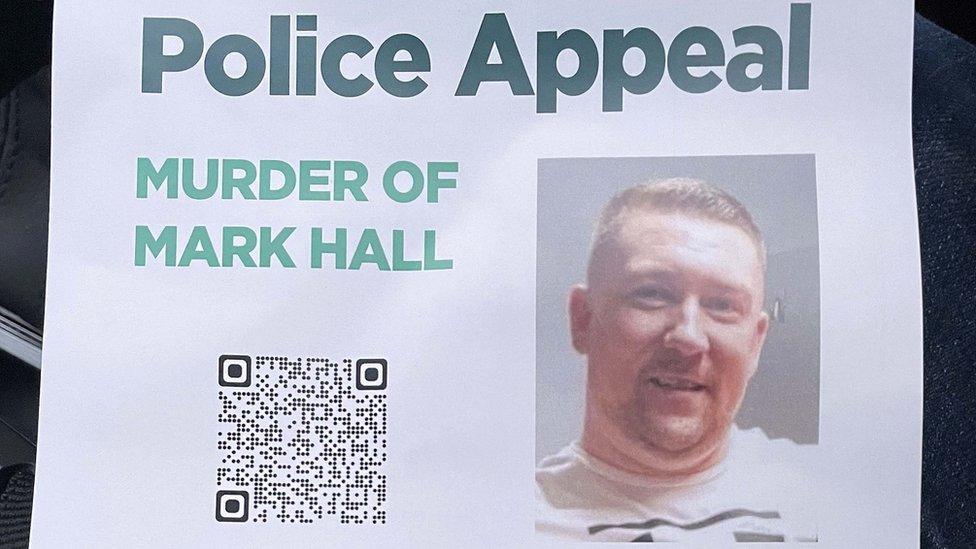Belfast gun victims’ families fear culprits will not be caught
- Published

Mark Hall with his partner Sabrina Wilde
Relatives of those killed in a spate of gun murders in Belfast over the past four-and-a-half years are concerned the culprits will never be caught.
Mark Hall, 31, was shot dead in his family home in the Lower Falls in 2021.
Jim Donegan, 43, was shot dead outside a school on the Glen Road in 2018.
In their first broadcast interviews, Mr Hall's partner, Sabrina Wilde, and Mr Donegan's brother, Sean, tell BBC Spotlight about the impact the murders have had on their families.
In both murders, police have said dissident republican activity is a line of inquiry.
Sabrina Wilde describes hearing the gun attack on her partner Mark Hall while she spoke to him on the phone
Ms Wilde told BBC Spotlight she would leave her partner's killers "to God".
"I pray to him every day that he will do the right thing. They're all cosy in their beds and enjoying life while they destroyed mine," she said.
The Police Service of Northern Ireland (PSNI) said gun murders were extremely complex and there had been both charges and convictions in a number of fatal shootings in recent years.
Spotlight has also spoken to Sean Donegan, whose brother Jim was murdered while collecting his son from school in west Belfast in December 2018.
The Donegan family, who have never spoken publicly before, are taking the PSNI to court, claiming it mishandled intelligence prior to the murder.
Sean Donegan said that while he had faith in the police investigation after his brother's murder, he now has none.

Sean Donegan says he has no faith in the police investigation
"They're meant to be here to protect the community. They failed," he said.
The PSNI said Jim Donegan's murder was a "deplorable, violent act".
It added that the Donegan family's court case and an ongoing Police Ombudsman probe into the police's handling of the murder investigation meant it could not comment on the issues raised by Sean Donegan.
The programme examines links between a number of murders carried out between late 2018 and autumn 2022 where assassins have struck swiftly and ruthlessly, apparently leaving little forensic trace.
Despite some of the victims being alleged to have had links to organised crime, in every case the police have said that dissident republican involvement was a line of inquiry.
Police initially blamed the murder of Jim Donegan on the Irish National Liberation Army (INLA), which has been heavily linked to organised crime, before also pointing the finger at another dissident republican group, Oglaigh na hEireann (OnH).
The organisation went on "military ceasefire" in 2018 but there is significant evidence that it is still involved in criminality, including murder and procuring new weaponry.
In a speech at Milltown Cemetery in west Belfast at Easter 2022, masked OnH members appeared and a speech was read out on their behalf boasting of the organisation having used "lethal force" against people it believed were drug dealers and "British agents".

Rajan Basra said the authorities should know where to look online for traces of OnH
They also wielded guns made using a 3D printer which, according to arms expert Rajan Basra, was the first time a paramilitary group had ever been seen with the relatively new firearms.
"The weapons can definitely be lethal. Although terrorist adoption of them is probably in the early stages there's demonstrable proof that these firearms do work, and they are effective," he said.
Mr Basra of King's College London said the blueprint for the kind of 3D gun on show at Milltown was known only to people in a shadowy online group - potentially presenting an opportunity for law enforcement.
"When OnH made this public appearance with the 3D printed gun, they inadvertently signalled to people that they were members of that private group," he said.
"And so, if the authorities were looking at that, they would know exactly where they need to focus their attention to perhaps see the online traces of ONH."
The PSNI told Spotlight ONH was a proscribed organisation and police would continue to investigate any criminality it was involved in.
BBC Spotlight's Murder on the Streets is now available on BBC iPlayer and will be on BBC One Northern Ireland on Tuesday at 22:40 BST.
- Published4 December 2021

- Published22 January 2022
